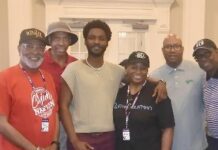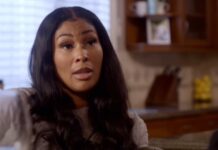 *With appearances on TV and movie screens in a variety of roles, Roy Fegan has been a noticeable face for many years.
*With appearances on TV and movie screens in a variety of roles, Roy Fegan has been a noticeable face for many years.
While you may not remember everything he’s been featured in, it’s a sure bet that Fegan’s most famous character will instantly trigger recognition. As Bird, lead singer of Bird and the Midnight Falcons, the actor was a memorable fixture in Robert Townsend’s “The Five Heartbeats” while serving as the titular singing group’s competitive rival turned most valuable asset in taking down corrupt record label owner Big Red Davis, portrayed by Hawthorne James.
The change of heart is even more prevalent, considering the rough treatment Bird received when he confronted Big Red over royalties owed to him.
Does the line, “My office hours are from 9 to 5” ring a bell?
If so, Fegan and Bird are no strangers to you. Neither is “The Five Heartbeats,” which celebrates its 25th anniversary this year. As he joins fans in cherishing the film’s cast and legacy, Fegan continues making major moves with his son Roshon with their production company, 3inaRo Entertainment. As it stands now, Fegan is currently writing and producing “Blondie,” a film centering on the story of Florence Ballard, a member of iconic vocal group The Supremes.
“Obviously Florence was the lead singer from The Supremes and I re-penned it, the script,” said Fegan, who joins Roshon in working on ‘Blondie’ via 3inaRo. “I rewrote it and we are in the process of working with investors and are still looking for new investors. That’s my latest project, the Florence Ballard story, ‘Blondie.’”
Chatting with EURweb, Fegan opened up about his involvement in “The Five Heartbeats,” it’s influence on today’s black filmmakers, how the music business in the movie is similar to today’s music scene and why he will forever be known as “the 9 to 5 man.”
EURweb: Your character Bird was definitely one of the standouts in “The Five Heartbeats.” What attracted you to the character?
Roy Fegan: If you didn’t know, I had already been working with Robert for over five years. Maybe four or five years doing HBO specials, doing [Townsend’s first film] ‘Hollywood Shuffle.’ We were already working, doing a bunch of different projects and from what I got from Robert is he wrote the role with me in mind. That was an honor. And he mentioned that he had something really cool coming up. I remember going to probably my first rehearsals in the film business because…usually you get a job and you don’t really rehearse it. You just audition, you get the part and then at that point then you’re working.
I remember going there and I was like, ‘Wow, this is really awesome’ and I’ve never been involved in a rehearsal for a film. It was just kind of an honor to be a part of a film rehearsal, a first for me. And I was able to see it all come together in a rehearsal. It was kind of magical in a way, that you get to rehearse and kind of see what you’re gonna be doing pre-the set. And it was foreshadowed on what was gonna happen on the set. It gave me a chance to really be excited about, ‘Wow this is a juicy little role and pivotal character that really sings and moves, something I can sink my teeth into.’ So when you say, ‘Was I excited? Was I happy? Was I proud?’ Very much so, to be a part of the future classic. I had no idea it would be a classic, but it definitely had the makings of a classic written all over it.
EUR: For many people, “The Five Heartbeats” is regarded as a true classic. why do you think this film continues to resonate after all these years?
RF: First of all, it connects with individuals that remember the time. It connects with music. Music is universal. You can never lose with a musical story that has a powerful, emotional story structure around it. The story of music is about listening to things that move you. And then Robert’s job was to put interesting characters around his story and he did that beautifully and then directed those characters to come to life.
One of the things that was a pleasure was old, young and even babies can enjoy “The Five Heartbeats.” Even if they’re not able to follow the storyline, they can enjoy the music. The family, grandma, dad, mom, siblings watching this movie. Because it’s so captivating, it can actually lure in a younger audience from its emotional power. It brings in a universal story that is a story of togetherness. A story of people who got lost and found themselves along the way to just be friends along all of the misfortunes and ups and downs in music. It all comes back down to relationships. And relationships are the key to everything in this world. Relationships triumph over failure.
And so that’s what we had. A beginning, middle and end that ended in just good friends that came back together through all the trials and tribulations of the music business. Of trying to be successful, trying to leave a group and singling out another to say, ‘I’m better than this group’ or I’m better than that singer’ or ‘I’m better than that person.’ I think people can relate to the competition. Competition is keen in the world of showbiz. It’s a driving force in corporate America. It’s even a driving force in the family structure in a very competitive world. A competitive world means everyone around you is competing to be better. And with that, creates some sort of strife. It creates some sort of negativity around you that we have to all learn how to adjust and just get along and be friends and work it out.
That movie showed, throughout it all, people going through a problem. At the end of the day, Rodney King said it best: ‘Can we all just get along?’
 EUR: When you look at films now, what do you see that can be attributed to the influence of “The Five Heartbeats”?
EUR: When you look at films now, what do you see that can be attributed to the influence of “The Five Heartbeats”?
RF: Man, I just saw something called ‘Brotherly Love.’ I’ve been looking at a lot of Netflix films. The black filmmaker has arrived. Me being a writer and a director myself, I can only pray and hope that I can get close to the power, the emotional power and connection that ‘The Five Heartbeats’ had with its audience.
When you’re a writer, you want to write from within and share your story. You know a writer has his own voice. However, his voice has to permeate to the people and if it does, you’re successful if your story connects. I’m watching so many great films. Their quality of filmmaking and telling stories for the black filmmaker has increased to the point where I’m moved. It doesn’t mean you have to shoot it in film. It doesn’t mean you have to have the best and biggest budget. It just means you have to know how to tell a great story and I think filmmakers, our black filmmakers, have learned how to tell a great story.
I can only say that because ‘The Five Heartbeats’ did a great story and was told and directed by a man who told his story. Of course, Keenen Ivory Wayans co-wrote ‘The Five Heartbeats,’ if you did not know. A lot of people don’t say in print or give credit to, but both Robert and Keenen wrote a powerful story. The influence for the generation has been incredible. It’s been incredible on me to be a part of it as an artist, a writer and director. To know that if I’m gonna tell a story, whether it be comedy or drama, I’ve worked with the greats and I know if the story is funny. I know if the story is moving. I know if the flavor is there to touch people because I’ve been a part of it. With my own eyes. I’ve been a part of it with my own eyes. I’ve been a part of watching great filmmakers at work. And I can say the influence for me and other filmmakers has been tremendous.
 EUR: Back then, the music industry was way different. Different time. Different set of circumstances. Comparing conditions depicted in “The Five Heartbeats” to how things are now, do you see similarities or differences?
EUR: Back then, the music industry was way different. Different time. Different set of circumstances. Comparing conditions depicted in “The Five Heartbeats” to how things are now, do you see similarities or differences?
RF: Oh man, come on. It’s beyond similarities. It’s very vicious business in the music business because just when you think you’ve got everything when you’re working with a record label, you have nothing. You have to fight to get your royalties. You have to fight to get marketing. You have to fight to get distribution. And just when you have a hit record, now you may not even own your own name.
So nothing has changed. If anything, it’s perhaps gotten a little worse. But what’s happened, my son Roshon Fegan, who is an artist has learned a lot about ‘The Five Heartbeats’ the hard way. He’s been involved in a recording agreement. He’s been involved in music all his life and you learn what being an independent artist is really about. He chose to stay independent and he chose to pursue his music career and opportunity came along with a music label. And some of the things that I watched and learned through that was almost like reliving a bit of ‘The Five Heartbeats.’ It’s a very dog-eat-dog world because, you know, you work your ass off for a label and they’re not sure of what direction they want to go. One of the things that I learned from comparing it to ‘The Five Heartbeats’ is it’s better to be an independent artist and it’s better to be your own label. That’s exactly what he has done with his movement. He has a pretty good movement, going ahead from his lesson of when you want to make moves and when you want to be in this music business. And you play and you write and you sing and you dance and you do it all. It’s better to do your own thing, to have your own voice.
When you work with a label, labels are very controlling and maybe some of the things we saw in ‘The Five Heartbeats’ weren’t exactly what one goes through today. But it’s still a very vicious cycle. You cannot succeed unless you have a smash hit after smash hit. And then after that, then and only then that you’ve got a name for yourself to kind of fend for your own voice, to say, ‘Hey this is who I am. I’m moving forward.’ And I think that some labels know today that the artist is gonna choose to be independent over a label. Back in the older days, when there was no independent artist, you had to work with a label. I would say the biggest, newest thing that is different from the old days is now you can choose to stay independent. You can do it on your own. Back in the day, you did not have a choice. You had to work with a label. It was the only way by means of success, but it has changed today.
 EUR: That scene with Bird and the Midnight Falcons competing against the Heartbeats was one of many people remember from the movie.
EUR: That scene with Bird and the Midnight Falcons competing against the Heartbeats was one of many people remember from the movie.
RF: The scene for the talent show was definitely one that can hype up any rock star or wannabe rock star.
And that’s what we created with Bird and the Midnight Falcons. We created a frenzy. The idea Robert had, a rival group that was just as good, if not better, than The Five Heartbeats created real competition. It felt real. It felt so real that even to this day, I am still a wannabe singer. I’m a wannabe singer. I’m a singer who has never exercised the right to go out and to say, ‘I’m gonna do it.’ But one of the things that it has done for me is let me know that in no way I am a shy individual because the thing about filmmaking and staging and all of these things that we do as an actor or performer is when you’re out there as a rock star, it’s just you. And you move that audience. And when they really like you, even if the director is telling the extras, ‘You’re gonna scream here and you’re gonna go crazy,’ its very contagious. And if you like that scene and it was very, very, very entertaining, it’s because I was having fun and I believed what my surroundings were.
An audience going crazy over a man onstage with his Midnight Falcons on the side of him. It’s not hard for the actor to get caught up and believe he’s there. I really believed I was there. And actually, I would do it again if I had to.

EUR: Looking back, can you describe how things were for you during the height of popularity of The Five Heartbeats?
RF: Aw man. Oh my God. It was just tremendous. I was able to tour around the country and do things, just innocently going to a store, people. My closet line, ‘9 to 5,’ you know was the big joke. The ‘9 to 5’ line is the best that they could come up when they see me. ‘There’s the ‘9 to 5’ guy. It’s Bird.’ A long time they would call me Flash [the lead singer of rival group Flash and the Ebony Sparks]. I would get, ‘Hey man. Oh my god. I love you Flash. I mean Bird. I mean Flash and Bird. Bird and the Flash.’ And so they would get those two mixed up. But they would always know for sure, ‘Man. When you said ‘9 to 5,’ when he was hanging you out the window. Man, that’s my favorite line man. He kicked your ass.’
It was very clear that I became the ‘9 to 5’ man. And I’m not mad. I’m not mad because to be remembered for anything in showbiz is maybe not always a good thing. But it could be a great thing when they associate you with the classic film ‘The Five Heartbeats.’ The ideal of it was so great for the reward, to know that it kind of brought people back to the moment of not only the classic film, but the classic moments in the film. You know having a great movie also means there are great moments in there. And I’m just very fortunate and blessed to be one of those great moments.
Fegan’s remembrance of Bird and “The Five Heartbeats” comes as Townsend prepares to release a documentary on the making of the classic film, which is planned to be released in the fall.
We Publish News 24/7. Don’t Miss A Story. Click HERE to SUBSCRIBE to Our Newsletter Now!





